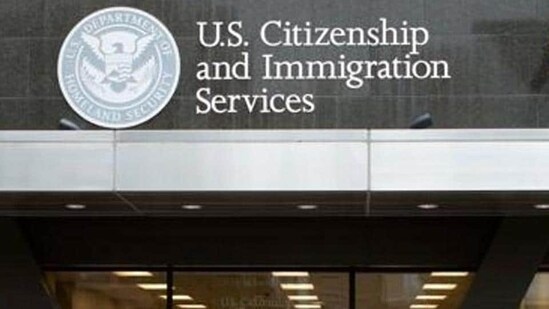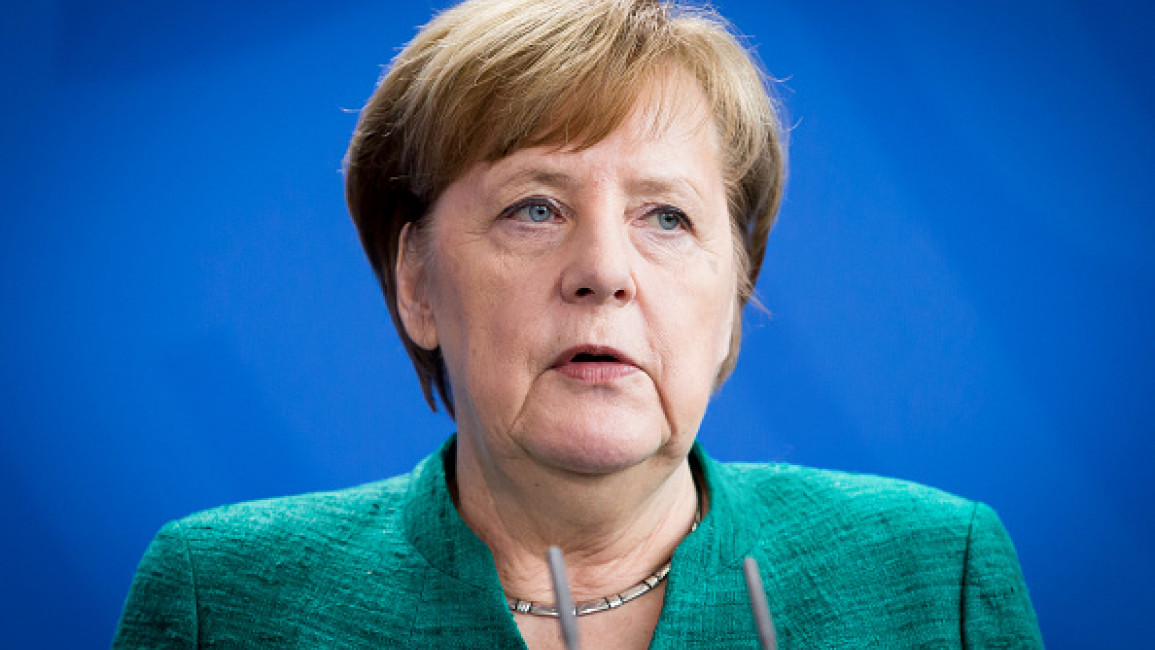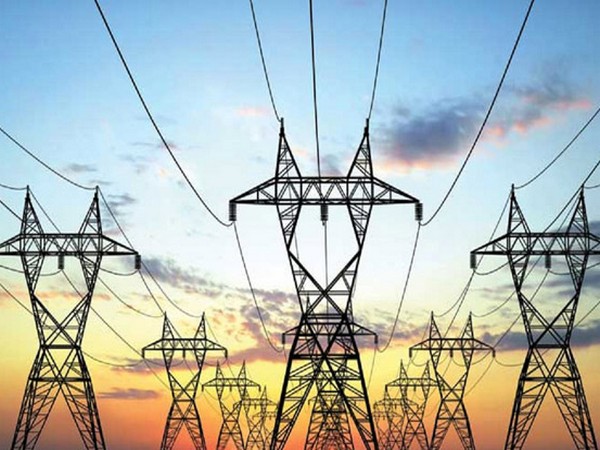PM faces rebellion after going back on earlier Conservative promises
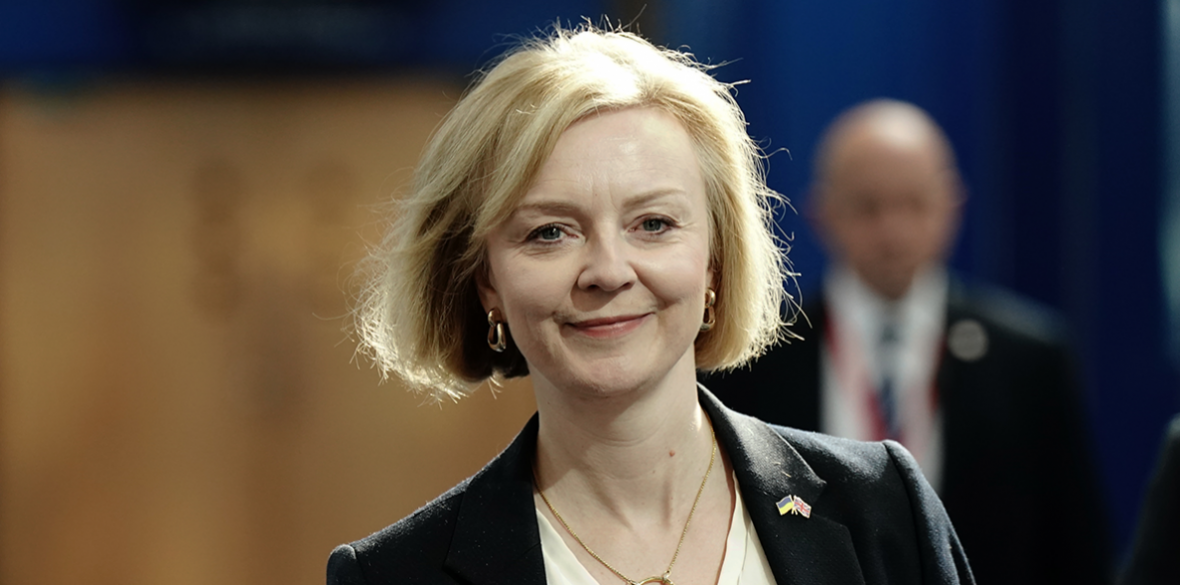
Prime Minister Liz Truss arrives for the Conservative Party annual conference at the International Convention Centre in Birmingham. Picture date: Monday October 3, 2022.
THE Tories plunged into yet more chaos today as Liz Truss faced mounting anger for refusing to commit to increasing benefits in line with inflation.
The Prime Minister faced a new rebellion from within her party amid bitter infighting at the Conservative Party conference after refusing to say she would stick to the promise on benefits given by her predecessor Boris Johnson.
It follows Monday’s humiliating climbdown over heavily criticised plans to give huge tax cuts to the super-rich.
Ms Truss also refused to rule out raising the state retirement age today, saying she was resisting speculation on “all kinds of decisions that haven’t yet been made” but insisted she would “do what it takes” to address the economic outlook.
Labour shadow chancellor Rachel Reeves condemned the Tories, saying: “The idea that the government can afford to give tax cuts to the wealthiest but not uprate benefits in line with inflation, I think, is grotesque.”
The latest policy debacle means the PM has now sparked a split within her Cabinet, a rift with backbenchers and caused a wave of anger among campaign groups. Downing Street has not denied Ms Truss could decide to instead increase benefits in line with wages, which are falling far behind inflation.
Benefits are usually uprated in line with the consumer price index rate of inflation from September, with the rise coming into effect the following April.
Katie Schmuecker of the Joseph Rowntree Foundation said the PM “must be clear that she won’t target cuts at those on the lowest incomes who have been struggling for months to feed their families, cook hot food and heat their homes.”
Marie Curie charity’s Dr Sam Royston warned: “There are no two ways about this: a real-terms cut to benefits would be a direct cut to support for dying people.”
Michael Clarke, head of information programmes at poverty charity Turn2us, said: “Millions of us are already left without enough money to live on. The government must keep its promise to raise benefits to match inflation this April.”
Commons leader Penny Mordaunt, a rival candidate to Ms Truss in the recent leadership contest, was first to break Tory ranks when she told reporters that it makes sense to increase benefits in line with inflation, and Work & Pensions Secretary Chloe Smith is also reported to have deep reservations over benefit cuts.
Wales Secretary Robert Buckland became the second Cabinet member to come out against the leadership’s plans.
He said: “The safety net is an important part of what a one-nation Conservative is all about.”
Former Cabinet ministers Michael Gove and Damian Green have already spoken out against failing to raise benefits in line with inflation.
Mr Green said the PM would probably not get benefit cuts through Parliament and former Tory Party chairman Sir Eric Pickles agreed, saying it was almost certain the government didn’t have the support to win a Commons vote.
Former Tory MP Anna Soubry tweeted: “If this government cuts the value of benefits to fund tax cuts for the wealthiest, we must exercise our democratic right and take our protest to the streets.
“This government has no mandate for such an appalling shift in policy.”
Chancellor Kwasi Kwarteng has said the government is committed to maintaining the so-called triple lock on pensions.
The triple lock guarantees that pensions are uprated each year by inflation, earnings or 2.5 per cent, whichever is higher.
BIRMINGHAM, ENGLAND
REUTERS
:format(jpeg)/cloudfront-us-east-1.images.arcpublishing.com/tgam/GOF7EHZP7BLTZNXA6PPBPGZG2A.jpg)
British Prime Minister Liz Truss and Chancellor of the Exchequer
Britain’s new Prime Minister Liz Truss triggered a fresh row in her party on Tuesday by suggesting that she could limit increases in benefit payments by less than soaring inflation as she seeks ways to fund her tax-cutting growth plan.
Britain’s new leader has endured a tumultuous time since she came to power on Sept. 6, first leading national mourning for Queen Elizabeth before releasing an economic package that immediately roiled financial markets.
Seeking to snap Britain out of more than 10 years of economic stagnation, Truss and her finance minister Kwasi Kwarteng set out £45-billion of unfunded tax cuts on Sept. 23 alongside promises to deregulate the economy to stoke growth.
On Monday they bowed to pressure to scrap the most divisive policy – eliminating the top rate of income tax for the highest earners – and are now working urgently on the full details of the plan and how they will be able to afford it without leaving a huge black hole in the country’s public finances.
“We have to look at these issues in the round. We have to be fiscally responsible,” Truss told BBC Radio when asked whether benefit payments would rise in line with record-high inflation to prevent the poorest in society from becoming poorer.
Immediately lawmakers in Truss’s Conservative Party – some fresh from forcing top tax rate reversal – opposed any move to reduce the increases in benefits at a time when millions are struggling with higher costs of food and energy.
Penny Mordaunt, who is in Truss’s cabinet of senior ministers, said benefits should rise in line with inflation. Damian Green, part of the Conservatives’ centrist faction, said he doubted any real-terms reduction would pass a parliamentary vote.
“I think there will be many of my colleagues who think that when you’re reaching for spending cuts, benefit payments are not the way to do it,” Green told BBC Radio. Another lawmaker, Roger Gale, also signalled his opposition.
Kwarteng has set Nov. 23 as the date for his next fiscal statement but the government is considering bringing that forward.
Truss became Britain’s fourth leader in six years last month, promising to reignite the economy and bring some political stability after the chaotic leadership of Boris Johnson.
Chosen by her party’s members, not the broader electorate, she was not the most popular candidate among the more than 350 Conservative members of parliament and her decision to stake out a tax cut plan and then concede defeat has left lawmakers and investors questioning her judgment and authority.
At the annual Conservative Party conference in Birmingham, central England, some lawmakers and commentators have questioned whether she has a mandate to take Britain back to a 1980s-style Reagonomics policy without a national election.
The Conservatives won the 2019 election with Johnson promising to increase spending on public services.
“It is not a great thing to sell the public on one type of package and vision, and then completely flip it and appear not to care,” Rachel Wolf, the co-author of the Conservatives 2019 manifesto, said at the start of the conference.
Investors have also taken fright at the new economic policy direction, hammering the value of British assets so hard that the Bank of England had to intervene last week with a package worth up to £65-billion to shore up the bond market.
Mohamed El-Erian, an adviser to financial services giant Allianz, said the government needed to get its house in order. “We are not a developing country and we need to stop acting like a developing country,” he told Sky News.
The BoE action has calmed markets, at least for now, while investors also took some comfort from the tax U-turn and the hoped-for move to bring forward the publishing date for the next fiscal plan from Nov. 23.
But Boris Glass, senior economist at S&P Global ratings agency, said Britain faced a difficult winter, and spending cuts could counter efforts to boost the economy.
“Unless strong medium-term growth can fully fund the extra spending, medium-term fiscal tightening appears inevitable, which may weigh on future growth,” he said.
Liz Truss Fails To Rule Out More U-Turns As Tory Benefits Rebellion Grows
The Conservative party conference has already seen two major government climbdowns.
By Kevin Schofield
04/10/2022

Prime Minister Liz Truss leaving the Hyatt hotel in Birmingham, during the Conservative Party annual conference at the International Convention Centre in Birmingham. Picture date: Tuesday October 4, 2022.
JACOB KING VIA PA WIRE/PA IMAGES
Liz Truss has failed to rule out any more government U-turns as the Tory rebellion against plans to cut benefits in real terms gathers pace.
The prime minister was repeatedly asked in radio interviews this morning whether further climbdowns were coming after Kwasi Kwarteng abandoned plans to scrap the 45p income tax rate for the highest earners.
The chancellor then followed that up by bringing forward a Commons statement on how he plans to balance the books from November 23 until later this month
As revealed by HuffPost UK yesterday morning, the government is now coming under fresh pressure from Tory MPs to stick by Boris Johnson’s promise to increase benefits by the rate of inflation.
Asked on LBC whether there would be any more government U-turns, the PM said: “I am determined to carry on with this growth package - that’s what’s important to people - and that we bring the country with us.”
On the benefits bill, Truss refused to be drawn on whether it will increased by average earnings or the more expensive rate of inflation.
She told Radio 4’s Today programme: “We are going to have to make decisions about how we bring down debt as a proportion of GDP in the medium term.
“I am very committed to supporting the most vulnerable; in fact, in addition to the energy price guarantee we’re also providing an extra £1,200 to the poorest households.
“So we have to look at these issues in the round, we have to be fiscally responsible.”
Her comments came as Commons leader Penny Mordaunt became the first minister to publicly say benefits should rise by inflation.
She told Times Radio: “I’ve always supported - whether it’s pensions, whether it’s our welfare system - keeping pace with inflation. It makes sense to do so. That’s what I voted for before.”
Meanwhile, former cabinet minister Damian Green became the latest Tory MP to urge the government not to cut benefits in real terms
He told the Today programme: “If people are already struggling, and many of these people will be, then making them struggle more is not a sensible response to the problems.
“I completely agree with the prime minister when she says you’ve got to see this in the round, but in the round it doesn’t make sense to give an extra £1,200 of help for energy bills to the poorest people in the country and then say but we’re going to claw hundreds of pounds of that back.”
Green said that due to the size of the looming Tory rebellion, Truss would “probably” not be able to get a benefits cut through parliament.
He said: “I think there that will be many of my colleagues who think that when you’re reaching for spending cuts, benefit payments are not the way to do it.”
Liz Truss pledges ‘responsible’ approach to public finances but refused to commit to raising benefits
Liz Truss is facing pressure to increase benefits in line with inflation
By Claire Schofield
Tuesday, 4th October 2022
Liz Truss stressed she must take a “responsible” approach to the public finances as she faces a fresh battle with Tory rebels fighting real-terms cuts to benefits.
The Prime Minister is refusing to rule out a return to austerity or say whether welfare payments will be increased in line with rising inflation.
Critics who forced Truss and Chancellor Kwasi Kwarteng to U-turn on plans to abolish the 45p tax rate for top earners on Monday are now stepping up pressure on the government to confirm benefits will be raised.
Mr Kwartneg has already made a second change of course to reassure markets and Tory rebels by bringing forward his medium-term fiscal plan along with independent forecasts, while Ms Truss has committed to increase pensions in line with prices. However, on benefits she said “we have to be fiscally responsible”.
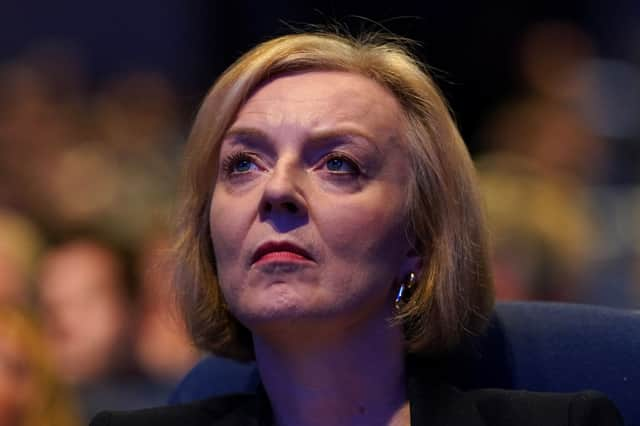
What has Liz Truss said about raising benefits?
Benefits are usually uprated in line with the consumer price index (CPI) rate of inflation from September, with the rise coming into effect the following April.
The Institute for Fiscal Studies estimates that each percentage point rise in CPI adds £1.6 billion to welfare spending.
In an interview pre-recorded on Monday, Ms Truss told Tuesday’s BBC Radio 4’s Today programme: “We are going to have to make decisions about how we bring down debt as a proportion of GDP in the medium term.
“I am very committed to supporting the most vulnerable; in fact, in addition to the energy price guarantee we’re also providing an extra £1,200 to the poorest households.
“So we have to look at these issues in the round, we have to be fiscally responsible.”
Ms Truss told LBC radio that “no decision has been made yet on benefit uprating”, adding that it “will be taken in due course”.
Pressed on why she has committed to increasing pensions but not benefits, she explained: “What I mean is when people are on a fixed income, when they are pensioners, it is quite hard to adjust.
“I think it’s a different situation for people who are in the position to be able to work.”
The Prime Minister added that she has committed to reducing debt as a proportion of national income over the medium term, adding that she is taking “ fiscal responsibility”.
What have other Tory MPs said?
Commons Leader Penny Mordaunt has publicly backed increasing benefits so that people can afford to pay their bills.
Ms Mordaunt, who ran against Ms Truss in the Tory leadership contest, said it “makes sense” to increase benefits in line with inflation.
She told Times Radio: “We want to make sure that people are looked after and that people can pay their bills.
“We are not about trying to help people with one hand and take away with another.”
Former Cabinet ministers Michael Gove and Damian Green have both spoken out with concerns about any failure to raise benefits in line with inflation, while Mel Stride, Tory chairman of the Treasury Select Committee, said he would have to “think long and hard” if asked to vote to increase benefits in line with earnings rather than inflation.
Mr Stride told Today: “The last time the benefits were uprated, because of the way the mechanism works they’re uprated in April but they’re pegged against the previous September’s inflation, and the way it worked last time was the uprating was just 3.1% because inflation was low the previous September, but of course inflation was much higher than that (in April).
“So we’re coming off the back actually of a kind of quite a strong real-terms squeeze on those benefits already so I think that will be a really tough call to make.”
Liz Truss has insisted she must take a “responsible” approach to the public finances, refusing to rule out real-terms cuts to benefits as she faces a Cabinet split and a fresh battle with Tory rebels.
By Alexander Brown
Tuesday, 4th October 2022,
The Prime Minister is refusing to rule out a return to austerity or say whether welfare payments will be increased in line with soaring inflation.
Critics who forced a U-turn over the plan to abolish the 45p tax rate for top earners are now stepping up pressure on the Government to confirm benefits will be raised.
Commons Leader Penny Mordaunt has publicly backed increasing them in line with inflation so that people can pay their bills, warning many Tory colleagues have backed that before.
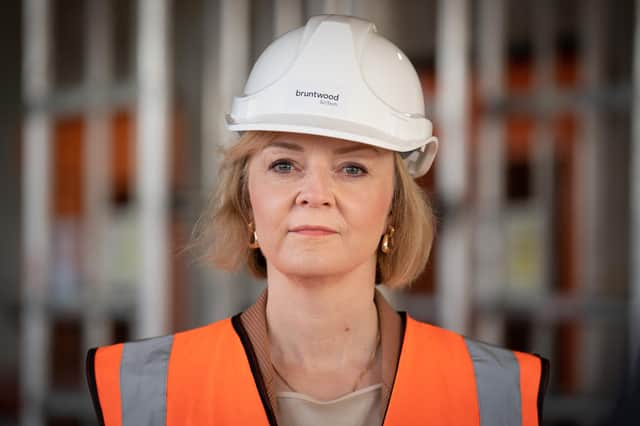
Downing Street has not denied suggestions that Ms Truss could resist rebels’ pressure to instead increase benefits in line with earnings, which are far lower than inflation.
Chancellor Kwasi Kwarteng has already made a second change of course to reassure markets and Tory rebels by bringing forward his medium-term fiscal plan along with independent forecasts.
Ms Truss has committed to increase pensions in line with prices but on benefits said “we have to be fiscally responsible”.
In response to Ms Mordaunt’s comments, the Prime Minister said no decisions had yet been made.
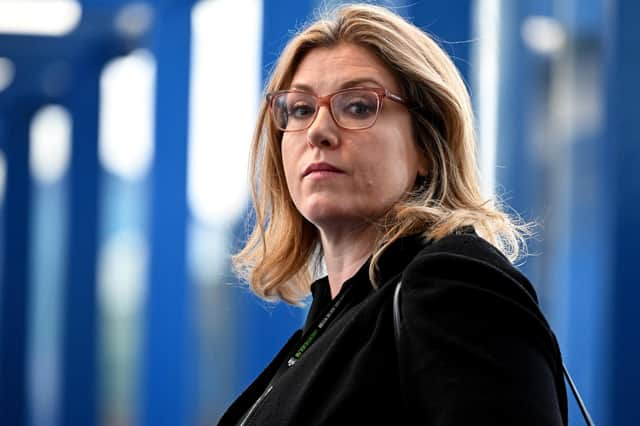
During a visit to a construction site in Birmingham, she told broadcasters: “On the subject of benefits we have not yet made that decision.
“Of course there will be discussions about the way forward on commitments like benefits.”

Tory conference: Can Liz Truss and Kwasi Kwarteng survive such a disastrous U-turn
Asked if she was listening to the Cabinet minister, Ms Truss said: “I’m very clear that going into this winter we do need to help the most vulnerable.
“In addition to the energy price guarantee we’ve also made sure the most vulnerable households have an extra £1,200 and this Government will always help people get on in life, whilst making sure the most vulnerable are protected.”
Benefits are usually uprated in line with the consumer price index (CPI) rate of inflation from September, with the rise coming into effect the following April.
The Institute for Fiscal Studies estimates that each percentage point rise in CPI adds £1.6 billion to welfare spending.
In an interview pre-recorded on Monday, Ms Truss told Tuesday’s BBC Radio 4’s Today programme: “We are going to have to make decisions about how we bring down debt as a proportion of GDP in the medium term…
“So we have to look at these issues in the round, we have to be fiscally responsible.”
Ms Truss conceded her start in No 10 has not been ideal, saying: “Is everything the Government (has) done absolutely perfect? No it’s not. I fully acknowledge that.”
While acknowledging it is a “challenging role,” she told broadcasters she is enjoying the top job.
Asked how she could deliver her policy pledges in the face of opposition from a significant cohort of her own MPs, Ms Truss insisted her Government will “continue to deliver”.
Earlier, when pressed on why she has committed to increasing pensions but not benefits, she told LBC radio: “What I mean is when people are on a fixed income, when they are pensioners, it is quite hard to adjust.
“I think it’s a different situation for people who are in the position to be able to work.”
Asked if she will rule out austerity, she said she has committed to reducing debt as a proportion of national income over the medium term.
“Well, I wouldn’t use the term you describe. What I’m talking about is fiscal responsibility,” she added.
Ms Truss sought to take some of the pressure off Mr Kwarteng as he faces criticism for the doomed plans to axe the 45% tax rate on earnings over £150,000.
She insisted that “we worked on it together” when questioned whose idea it was to abolish the tax.
But she refused to say she trusts her Chancellor when challenged by broadcasters, instead saying the two work “very closely”.
Defending the U-turn, Ms Truss said: “What we’ve done is we’ve listened to what people said on this issue.”
Mr Kwarteng had been planning to wait until November 23 to publish his medium-term fiscal plan and official forecasts from the Office for Budget Responsibility (OBR).
But it is understood he will publish them later this month after he told the Tory party conference in Birmingham he will set out more “shortly”.
The Prime Minister did not rule out raising the state pension age beyond 67, telling reporters: “You’re asking me to speculate about all kinds of decisions that haven’t yet been made.”
Asked whether the Government will help with mortgage payments driven up by rising interest rates, she said: “These are difficult times but we will do as a Government what we can to help people get through at the same time as making sure we’re building the positive economy of the future.”
The Daily Mail reported that the Prime Minister plans to raise benefits in line with earnings rather than inflation and tell recipients it is unfair to receive a higher raise than workers.
Around two-fifths of Universal Credit claimants – some two million people – are in work and inflation has soared to around 10% while wage growth has fallen far behind on closer to 5%.
Ms Mordaunt, who ran against Ms Truss in the Tory leadership contest, said it “makes sense” to increase benefits in line with inflation.
“I’ve always supported, whether it’s pensions, whether it’s our welfare system, keeping pace with inflation. It makes sense to do so. That’s what I voted for before and so have a lot of my colleagues,” she told Times Radio.
“We want to make sure that people are looked after and that people can pay their bills. We are not about trying to help people with one hand and take away with another.”
Former Cabinet ministers Michael Gove and Damian Green have already spoken out with concerns about any failure to raise benefits in line with inflation.
Mel Stride, Tory chairman of the Treasury Select Committee, said he would have to “think long and hard” if asked to vote to increase benefits in line with earnings rather than inflation.
Brilliant Rishi Sunak gotcha catches Liz Truss off guard
ITV's Harry Horton relayed the concerns of a man from Yorkshire during his interview with the prime minister.
by Jack Peat
2022-10-04
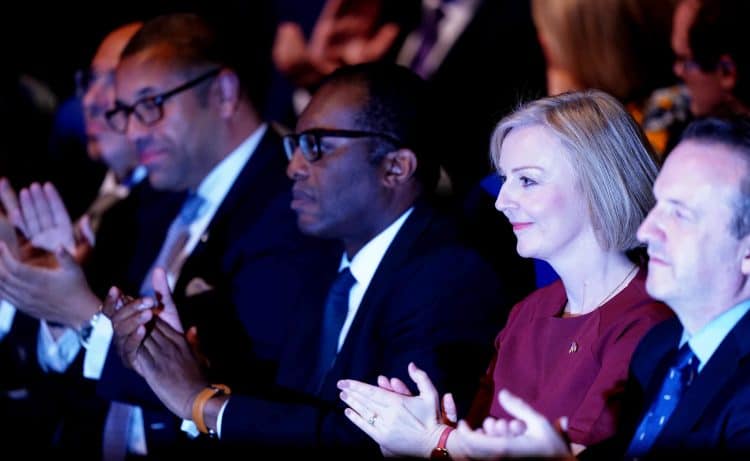
Conservatives will attempt to shift the focus away from the economy following the humiliation of two U-turns on income tax cuts for the highest earners and the date of a new fiscal plan.
Keynote speeches at the Tory conference in Birmingham on Tuesday by Home Secretary Suella Braverman and Foreign Secretary James Cleverly will aim to set out the Government’s plans on immigration and commitment to support Ukraine.
Liz Truss will be keen to get the annual gathering back on track after she and Chancellor Kwasi Kwarteng abandoned their plan to scrap the 45% rate for earnings over £150,000 in an astonishing U-turn to stave off a Tory revolt.
Growing economy
The Prime Minister admitted that it had not been an “easy” week but indicated she was sticking with the rest of the tax-cutting package.
She told the Express newspaper: “Express readers can rest assured: we will reward your trust.
“It has not been an easy week, but we have shown that we listen to people’s concerns and we are determined to deliver on our core plan for economic success and security.
“Our plan for growth is essential to get the British economy moving. Growth is the only way to create jobs, boost wages and fund our vital public services like the NHS.”
Sunak gotcha
Speaking to ITV’s Harry Horton, Truss said she understands why people are concerned about pensions and the economy.
Horton said: “I was listening to a man from Yorkshire recently who accused you of peddling fairy tale economics”, to which Truss responded:
“I understand people are concerned and that’s why we’ve stepped in.”
The ITV presenter said: “That man from Yorkshire was Rishi Sunak. He was right, wasn’t he?”




